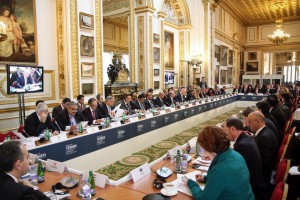24th September 2013 Sana’a, Yemen
Yemen’s International Friends
There are two significant events for Yemen this week outside the borders of this country. Both take place in New York. The first is the Friends of Yemen conference on Wednesday 25 September; the second a discussion on Yemen in the United Nations Security Council (UNSC) on Friday 27September.
Both are excellent opportunities for Yemen to show the world of what it is made. It is an opportunity for Yemen’s politicians to show that they are capable of bringing about change for the good of Yemen; for the members of the National Dialogue to be at the forefront of a peaceful transition process; and for the people of Yemen to show that they can work together to hold their government and institutions accountable. But this requires more action by all parties.

This will be the sixth meeting of the Friends of Yemen – the countries and institutions who are supporting Yemen’s political, economic and security transition. They want to see Yemen become a success: to see Yemen move from a situation of dire humanitarian need and build state structures that deliver security and basic services to all its citizens; and to reduce and remove the threat of terrorism within and outside Yemen. Terrorist action emanating from Yemen’s soil is still seen as a significant threat to the UK. So we want the best for Yemen, but also because it will benefit the UK.
The meeting will be attended by many Foreign Ministers, including the UK’s William Hague who will be accompanied by Development Minister Alan Duncan. It will look at Yemen’s political, economic and security transitions. We were hoping the National Dialogue would have concluded on time, but it is better to get it right and finish a couple of weeks late. Yemenis will then need to focus on the next steps in the transition process, including outreach to explain to all Yemenis how they will ultimately benefit. This will not be easy.
On the economy, Yemen will want to make some serious structural reforms to ensure it can balance the books. But these will be politically challenging. Under the Mutual Accountability Framework that has been agreed with international donors, we would like to see urgent action on eliminating ‘ghost’ workers from the civil service, fuel subsidy reform (with a social safety net for the poor), action on youth employment and an anti-corruption bureau with real power.
The Government has taken some action on these in advance of the Friends’ meeting. Now they need to be implemented: the first two measures alone would help balance Yemen’s books and put it on a more sound fiscal footing.
The Friends of Yemen have pledged nearly US$8 billion to Yemen. I bet you’re all thinking just what you could do with that amount of money. Me too. Which is why how it is spent is so important: it needs to be on projects that are transparent, accountable and sustainable. That can’t happen overnight, but it needs to be spent more quickly than it is now – which is the role of the new Executive Bureau, headed by former World Bank director, Hedi Larbi, from Tunisia.
The third area is security. The goal of a state should be to ensure rule of law and justice for all its citizens. There is a long way to go in Yemen. For all of us, there is also the issue of Al Qaeda here. The UK will be pressing its international partners to ensure ransom payments are not made if their citizens are kidnapped: this money goes straight to AQAP to finance their activities.
The Security Council meeting will include updates from Yemen’s Foreign Minister, Dr Al Qirbi, from the head of the GCC and from the UN. Yemen is discussed at these meetings every few months. Two years ago, it was difficult to imagine that Yemen would have come as far as it has: it has embraced dialogue over conflict. But this means compromises have to be made and not everyone will be happy with the outcome. So Yemen’s report card will be mixed: “top marks” for intent and for Dialogue and a “must try harder” on delivery. That’s not a bad outcome at this stage and I hope the next one will be even more positive.